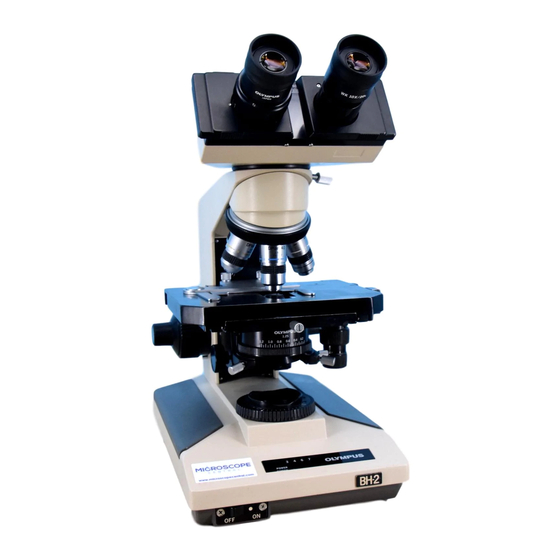Olympus BH-2 BHS Desmontagem, limpeza e remontagem completas - Página 6
Procurar online ou descarregar pdf Desmontagem, limpeza e remontagem completas para Microscópio Olympus BH-2 BHS. Olympus BH-2 BHS 23 páginas. Sliding focus block

Introduction
The microscopes in the Olympus BH‐2 line (BHS, BHSU,
BHT, and BHTU) have largely been replaced in the
professional and clinical world, due to their advancing
age and the lack of repair parts from Olympus. A great
many of these microscopes were produced in their day,
and because of this are they readily available on the
used market for very reasonable prices. Thanks to their
excellent build quality and solid optical performance,
these scopes are now very popular with hobbyists,
providing an affordable, high‐quality alternative to the
Chinese‐made scopes prevalent today. One problem
that might be encountered when purchasing one of
these scopes is that the focus action may be stiff due to
the decades‐old grease in the coaxial focus mechanism
and in the sliding focus block mechanism.
Scope of this Document
This document describes the complete teardown,
cleaning, and reassembly of the sliding focus block
mechanism in an Olympus BHTU stand. Since the
various BH‐2 stands use the same sliding focus block as
the BHTU, this document should allow a hobbyist with
reasonable mechanical abilities to service the sliding
focus block on any of the BH‐2 stands. Note that this
document covers the specific configuration of the
sliding focus block mechanism which utilizes crossed
rollers to provide smooth linear motion of the focus
block. The vast majority of the BH‐2 stands that were
ever produced used this mechanical configuration. The
very early stands that were manufactured (i.e., the first
200 or so) utilized bearing balls instead of crossed
rollers in the slide mechanism, and these early units are
outside the scope of this document
A Caution Regarding Stiff Focus Mechanisms
Avoid turning the focus knobs on any BH‐2 microscope
stand whose focus mechanism feels abnormally stiff.
Turning these knobs when there is excess resistance in
the mechanism, such as may be caused by dried grease,
puts high stresses on the plastic drive gears in the fine‐
focus mechanism, and these can be damaged if these
stresses are too high.
Tools Needed
The following tools will be needed to complete the
teardown, cleaning, and reassembly of the sliding focus
block mechanism in a BH‐2 microscope stand:
Allen wrench or driver: 2.5mm (item 1 of Appendix 2)
1
A future revision of this document may include the ball‐slide configuration,
if a suitable stand ever becomes available for this purpose.
Complete Teardown, Cleaning, and Reassembly of the Olympus BH‐2 Sliding Focus Block
1
.
Allen wrench or driver: 4.0mm (item 2 of Appendix 2)
Allen wrench or driver: 5.0mm, (item 3 of Appendix 2)
Screwdriver set, JIS (item 4 of Appendix 2)
A Few Words about JIS Screws
Screws with JIS heads are frequently found in much of
the equipment designed and manufactured in Japan.
JIS screws look very much like standard Phillips screws,
but they differ in that JIS screws were designed to not
cam‐out under torque, whereas Phillips screws were
designed to intentionally cam‐out as a means to limit
the torque applied to the fasteners. Because of this
crucial difference in the geometry of the two screw
types, JIS screws will be damaged by standard Phillips
drivers if too much torque is applied. JIS screws can
usually be identified by the presence of a single dot (or
by an "X") stamped into one of the four quadrants of
the cross‐point depression (see Figure 1).
Figure 1 – Head of a typical JIS screw
Supplies Needed
The following supplies will be needed to complete the
teardown, cleaning, and reassembly of the sliding focus
block mechanism in a BH‐2 microscope stand:
Cleaning solvents (see Recommended Solvents below)
Cotton swabs
Lubricants (see Recommended Lubricants below)
Tissues, oil free
Recommended Solvents
Some type of cleaning solvent will be needed to remove
the old grease from the various components of the
sliding focus block mechanism. Solvents that can be
used are acetone (commonly sold as fingernail polish
remover), diethyl ether, heptane, hexane, mineral
spirits, turpentine, and xylene.
Safety Considerations with Solvents
Regardless of which solvent is chosen, make sure that
adequate ventilation is present during the cleaning
Revision 2
Page 6 of 23
